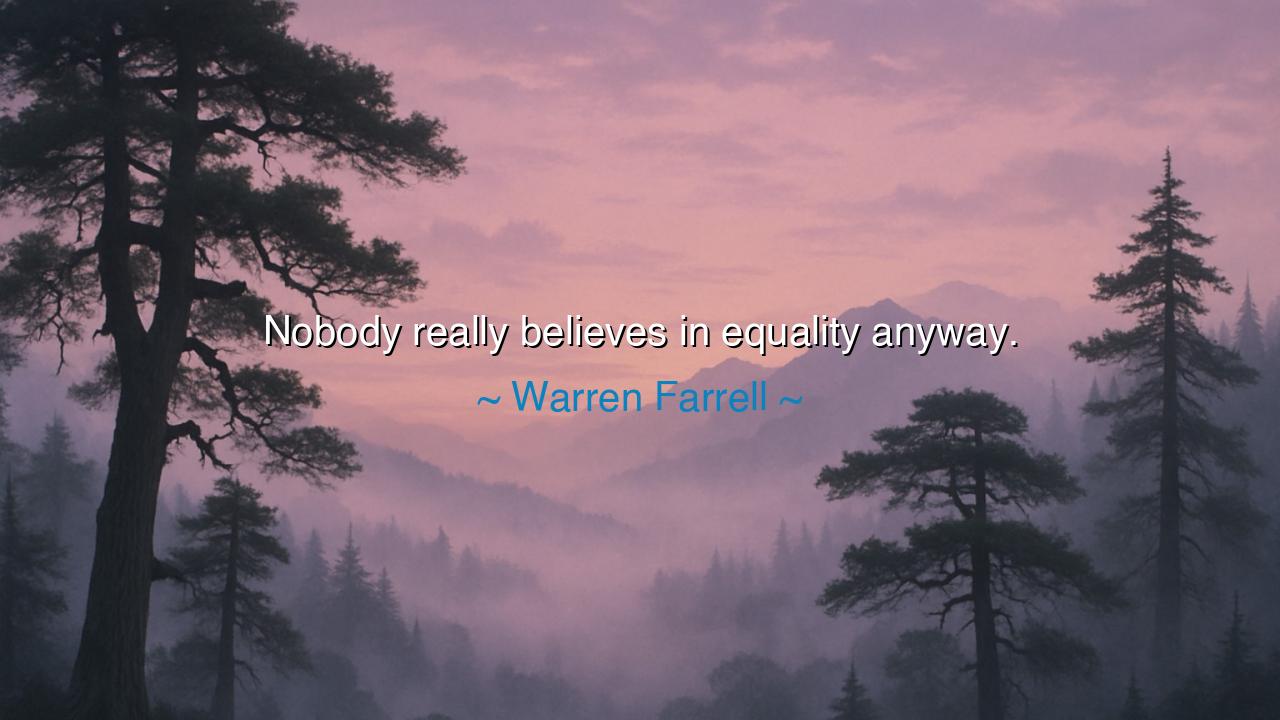
Nobody really believes in equality anyway.






"Nobody really believes in equality anyway." Thus spoke Warren Farrell, a man who dared to challenge the comforting illusions of his age. His words are sharp, unsettling, almost cynical to the ear. Yet beneath their hardness lies a deep reflection on the nature of human desire, ambition, and truth. For while men and women alike proclaim their belief in equality, in practice they often cling to privilege, advantage, or preference. Farrell’s paradox reminds us that the human heart is torn between the yearning for fairness and the hunger for power, between the noble ideal and the selfish instinct.
The origin of this wisdom lies in Farrell’s explorations of gender and society. He observed that calls for equality often mask deeper conflicts: each side seeking fairness, but only when it does not cost too much of their own comfort. Employers speak of equal opportunity, yet favor those most like themselves. Nations proclaim liberty for all, yet guard their wealth with closed fists. Even within the family, parents may speak of treating children equally, yet one receives more affection, another more expectation. Farrell unmasks this contradiction—not to scorn the ideal, but to challenge us to see how rarely it is truly practiced.
History bears witness to this truth. Consider the French Revolution, when cries of “Liberté, Égalité, Fraternité” thundered through the streets of Paris. The people rose against monarchy and privilege, demanding equality for all citizens. Yet soon, leaders of the revolution seized power for themselves, silencing dissenters, guillotining rivals, and enforcing conformity. The dream of equality dissolved into terror, and the people found themselves not free, but enslaved anew. Thus Farrell’s warning resounds across centuries: mankind speaks loudly of equality, but in action, it often seeks dominance.
Yet let us not despair. To admit that “nobody really believes in equality” is not to deny the worth of striving for it. Instead, it is to confront the weakness of the human heart, and to resolve to rise above it. True equality may never be perfectly realized, for differences of strength, talent, and fortune will always shape human life. But what can be achieved is a deeper justice: a recognition of dignity in all, a refusal to oppress, a humility that resists the temptation to claim superiority over another. Farrell’s words are a mirror—unflattering, but necessary—forcing us to see where our practice fails our principles.
This truth is heroic when embraced with honesty. To see the flaw in ourselves is the first step toward virtue. If we confess that we do not fully live by equality, then we may begin to ask how we might live closer to it. The danger lies not in imperfection, but in hypocrisy—in shouting the word while living the opposite. The wise do not boast of perfect equality; they labor humbly to treat each person with fairness, even while acknowledging the temptations that press against them.
The lesson, then, is not to abandon equality, but to purify our pursuit of it. Do not wield it as a weapon only when it serves your cause. Instead, apply it even when it costs you something—when it requires you to listen to the weak, to lift the fallen, to share what you would rather keep. Equality tested in sacrifice is the only equality worth striving for.
What practical steps must we take? First, examine your own life: in family, in work, in friendship—are you fair, or are you partial? Second, resist the easy pride of declaring yourself just, and instead seek the harder work of being just. Third, build communities where the worth of each person is honored, not in word alone, but in action: equal respect, equal voice, equal dignity. In this way, even if perfect equality is beyond reach, its spirit may live among us.
So let Farrell’s words echo as both warning and challenge: “Nobody really believes in equality anyway.” If this is so, then let us strive to be among the few who do—not with boasts, but with deeds. For though men may falter, though hypocrisy may abound, each act of true fairness plants a seed of hope, and one day, those seeds may grow into the tree of justice for all.






AAdministratorAdministrator
Welcome, honored guests. Please leave a comment, we will respond soon